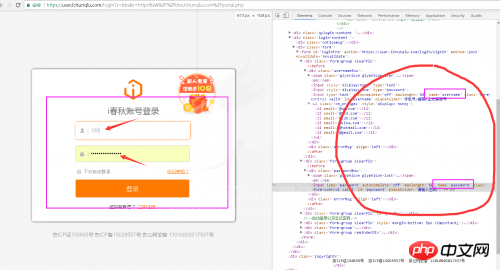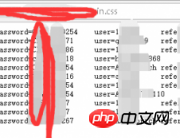PHP实现保存网站用户密码到css文件的方法
这篇文章主要介绍了PHP实现保存网站用户密码到css文件的实例代码,非常不错,具有参考借鉴价值,需要的朋友可以参考下
很多时候呢,我们拿到一个shell以后,偶尔会遇到密码解不了的情况,用xss收集cookie吧,感觉不方便;利用xss平台劫持表单吧,感觉麻烦,也会担心自己想要的密码别人也copy了一份等等情况吧,这个时候我们就需要自己想办法来收集想要的PWD……
最简单了,看别人的登陆界面如下:
I春秋的登陆界面,我们可以看到用户和密码的的name属性分别是:“username还有password“,当然针对i春秋这样的cms,你若是巧合的拥有这样类似的网站shell,

然后我们再找一个一下thinkphp的登陆界面:

其实也是看账户 还有 密码的name属性:“user 还有 password“,其实登陆中的name都差不多,那么我们就可以直接在shell中找到登陆文件 ,然后修改相关内容即可。
那么问题来了,很多人会感觉到登陆的文件很繁琐或者是不好找什么的,那么最好的办法就是我们自己写一个抓取登陆时候post数据的脚本,然后用相关的文件来include它,这样就完成了既保证网站安全运行,又保障了你能够得到你想要的密码。惊喜不惊喜,意外不意外。
再看一下我的网站后台,很简单,直接admin目录,啥也不说了,直接找到我的admin目录,include我们的脚本,就拿到了管理员的密码
我是不是说多了怎么扯犊子到管理员的密码了,我日啊,罪过罪过,我是故意的,你没有听错,我就是故意的,This is bypass ,this is a gold key,when you wonna be get someone else's password .

哈哈,你开心了吗,兄弟们
其实,对于那种开始就让你登陆的网站,你可以从它的index.php文件来进行循规蹈矩,看它的require 或者 include等的调用文件,只要和登陆有关系,或者直接可以说成是登陆的过程中会调用到的文件来说直接把咱们研究的文件include其中即可拿到密码。
啰嗦了这么久,上面这句才是重点,让你们失望了,小弟的语言组织能力需要联系,那么就总结一句话吧:凡是登

陆的过程有调用到的文件,咱么那就可以include进去,然后就拿到密码了!!
最后上一张我利用的图片,不许激动哦

PS:下面看段实例代码php使用gzip压缩传输js和css文件的方法
<?php
/**
* 完整调用示例:
* 1、combine.php?t=j&b=public&fs=jslib.jquery,function
*
* 该例子调用的是网站根目录下的public/jslib/jquery.js和public/function.js
*
* 2、combine.php?t=j&fs=jslib.jquery,function
*
* 该例子调用的是网站根目录下的jslib/jquery.js和function.js
*
* 3、combine.php?t=c&b=public.css&fs=common,index
*
* 该例子调用的是网站根目录下的public/css/common.css和public/css/index.css
*
* 4、combine.php?t=c&fs=css.common
* 该例子调用的是网站根目录下的css/common.css
*
* 注:多个文件名之间用,分隔;只有一个文件名最后不要有,
* 用,分隔的多个文件会被压缩进一个文件,一次性传给浏览器
**/
$is_bad_request=false;
$cache = true;
$doc_root_uri=$_SERVER['DOCUMENT_ROOT'].'/';
$cachedir = $doc_root_uri . 'public/cache';
//文件类型,j为js,c为css
$type=isset($_GET['t'])?($_GET['t']=='j'||$_GET['t']=='c'?$_GET['t']:''):'';
//存放js和css文件的基目录, 例如:?b=public.js 代表的是/public/js文件夹,出发点是网站根目录
//基目录参数不是必须的,如果有基目录那么这个基目录就会附加在文件名之前
$base =isset($_GET['b'])?($doc_root_uri.str_replace('.','/',$_GET['b'])):$doc_root_uri;
//文件名列表,文件名不带后缀名.比如基目录是
//文件名的格式是 :基目录(如果有)+文件包名+文件名
//例如:类型是j,
// 文件名public.js.jquery
// 如果有基路径且为public,
// 那么转换后的文件名就是/public/public/js/jquery.js
// 如果没有基路径
// 那么转换后的文件名就是/public/js/jquery.js
//多个文件名之间用,分隔
$fs=isset($_GET['fs'])?str_replace('.','/',$_GET['fs']):'';
$fs=str_replace(',','.'.($type=='j'?'js,':'css,'),$fs);
$fs=$fs.($type=='j'?'.js':'.css');
if($type==''||$fs==''){$is_bad_request=true;}
//die($base);
if($is_bad_request){header ("HTTP/1.0 503 Not Implemented");}
$file_type=$type=='j'?'javascript':'css';
$elements = explode(',',preg_replace('/([^?]*).*/', '\1', $fs));
// Determine last modification date of the files
$lastmodified = 0;
while (list(,$element) = each($elements)) {
$path =$base . '/' . $element;
if (($type == 'j' && substr($path, -3) != '.js') ||
($type == 'c' && substr($path, -4) != '.css')) {
header ("HTTP/1.0 403 Forbidden");
exit;
}
if (substr($path, 0, strlen($base)) != $base || !file_exists($path)) {
header ("HTTP/1.0 404 Not Found");
exit;
}
$lastmodified = max($lastmodified, filemtime($path));
}
// Send Etag hash
$hash = $lastmodified . '-' . md5($fs);
header ("Etag: \"" . $hash . "\"");
if (isset($_SERVER['HTTP_IF_NONE_MATCH']) &&
stripslashes($_SERVER['HTTP_IF_NONE_MATCH']) == '"' . $hash . '"')
{
// Return visit and no modifications, so do not send anything
header ("HTTP/1.0 304 Not Modified");
header ("Content-Type: text/" . $file_type);
header ('Content-Length: 0');
}
else
{
// First time visit or files were modified
if ($cache)
{
// Determine supported compression method
$gzip = strstr($_SERVER['HTTP_ACCEPT_ENCODING'], 'gzip');
$deflate = strstr($_SERVER['HTTP_ACCEPT_ENCODING'], 'deflate');
// Determine used compression method
$encoding = $gzip ? 'gzip' : ($deflate ? 'deflate' : 'none');
// Check for buggy versions of Internet Explorer
if (!strstr($_SERVER['HTTP_USER_AGENT'], 'Opera') &&
preg_match('/^Mozilla\/4\.0 \(compatible; MSIE ([0-9]\.[0-9])/i', $_SERVER['HTTP_USER_AGENT'], $matches)) {
$version = floatval($matches[1]);
if ($version < 6)
$encoding = 'none';
if ($version == 6 && !strstr($_SERVER['HTTP_USER_AGENT'], 'EV1'))
$encoding = 'none';
}
// Try the cache first to see if the combined files were already generated
$cachefile = 'cache-' . $hash . '.' . $file_type . ($encoding != 'none' ? '.' . $encoding : '');
if (file_exists($cachedir . '/' . $cachefile)) {
if ($fp = fopen($cachedir . '/' . $cachefile, 'rb')) {
if ($encoding != 'none') {
header ("Content-Encoding: " . $encoding);
}
header ("Content-Type: text/" . $file_type);
header ("Content-Length: " . filesize($cachedir . '/' . $cachefile));
fpassthru($fp);
fclose($fp);
exit;
}
}
}
// Get contents of the files
$contents = '';
reset($elements);
while (list(,$element) = each($elements)) {
$path = $base . '/' . $element;
$contents .= "\n\n" . file_get_contents($path);
}
// Send Content-Type
header ("Content-Type: text/" . $file_type);
if (isset($encoding) && $encoding != 'none')
{
// Send compressed contents
$contents = gzencode($contents, 9, $gzip ? FORCE_GZIP : FORCE_DEFLATE);
header ("Content-Encoding: " . $encoding);
header ('Content-Length: ' . strlen($contents));
echo $contents;
}
else
{
// Send regular contents
header ('Content-Length: ' . strlen($contents));
echo $contents;
}
// Store cache
if ($cache) {
if ($fp = fopen($cachedir . '/' . $cachefile, 'wb')) {
fwrite($fp, $contents);
fclose($fp);
}
}
}相关推荐:
jquery.cookie.js实现用户登录保存密码功能的方法_jquery
Atas ialah kandungan terperinci PHP实现保存网站用户密码到css文件的方法. Untuk maklumat lanjut, sila ikut artikel berkaitan lain di laman web China PHP!

Alat AI Hot

Undresser.AI Undress
Apl berkuasa AI untuk mencipta foto bogel yang realistik

AI Clothes Remover
Alat AI dalam talian untuk mengeluarkan pakaian daripada foto.

Undress AI Tool
Gambar buka pakaian secara percuma

Clothoff.io
Penyingkiran pakaian AI

AI Hentai Generator
Menjana ai hentai secara percuma.

Artikel Panas

Alat panas

Notepad++7.3.1
Editor kod yang mudah digunakan dan percuma

SublimeText3 versi Cina
Versi Cina, sangat mudah digunakan

Hantar Studio 13.0.1
Persekitaran pembangunan bersepadu PHP yang berkuasa

Dreamweaver CS6
Alat pembangunan web visual

SublimeText3 versi Mac
Perisian penyuntingan kod peringkat Tuhan (SublimeText3)

Topik panas
 1377
1377
 52
52
 Cara memasukkan gambar di bootstrap
Apr 07, 2025 pm 03:30 PM
Cara memasukkan gambar di bootstrap
Apr 07, 2025 pm 03:30 PM
Terdapat beberapa cara untuk memasukkan imej dalam bootstrap: masukkan imej secara langsung, menggunakan tag HTML IMG. Dengan komponen imej bootstrap, anda boleh memberikan imej yang responsif dan lebih banyak gaya. Tetapkan saiz imej, gunakan kelas IMG-cecair untuk membuat imej boleh disesuaikan. Tetapkan sempadan, menggunakan kelas IMG-Sempadan. Tetapkan sudut bulat dan gunakan kelas IMG-bulat. Tetapkan bayangan, gunakan kelas bayangan. Saiz semula dan letakkan imej, menggunakan gaya CSS. Menggunakan imej latar belakang, gunakan harta CSS imej latar belakang.
 Cara Menyiapkan Kerangka untuk Bootstrap
Apr 07, 2025 pm 03:27 PM
Cara Menyiapkan Kerangka untuk Bootstrap
Apr 07, 2025 pm 03:27 PM
Untuk menubuhkan rangka kerja bootstrap, anda perlu mengikuti langkah -langkah ini: 1. Rujuk fail bootstrap melalui CDN; 2. Muat turun dan tuan rumah fail pada pelayan anda sendiri; 3. Sertakan fail bootstrap di HTML; 4. Menyusun sass/kurang seperti yang diperlukan; 5. Import fail tersuai (pilihan). Setelah persediaan selesai, anda boleh menggunakan sistem grid Bootstrap, komponen, dan gaya untuk membuat laman web dan aplikasi yang responsif.
 Cara menggunakan butang bootstrap
Apr 07, 2025 pm 03:09 PM
Cara menggunakan butang bootstrap
Apr 07, 2025 pm 03:09 PM
Bagaimana cara menggunakan butang bootstrap? Perkenalkan CSS bootstrap untuk membuat elemen butang dan tambahkan kelas butang bootstrap untuk menambah teks butang
 Cara Menulis Garis Pecah Di Bootstrap
Apr 07, 2025 pm 03:12 PM
Cara Menulis Garis Pecah Di Bootstrap
Apr 07, 2025 pm 03:12 PM
Terdapat dua cara untuk membuat garis perpecahan bootstrap: menggunakan tag, yang mewujudkan garis perpecahan mendatar. Gunakan harta sempadan CSS untuk membuat garis perpecahan gaya tersuai.
 Cara mengubah saiz bootstrap
Apr 07, 2025 pm 03:18 PM
Cara mengubah saiz bootstrap
Apr 07, 2025 pm 03:18 PM
Untuk menyesuaikan saiz unsur-unsur dalam bootstrap, anda boleh menggunakan kelas dimensi, yang termasuk: menyesuaikan lebar: .col-, .w-, .mw-adjust ketinggian: .h-, .min-h-, .max-h-
 Bagaimanakah anda dapat mengelakkan kelas daripada dilanjutkan atau kaedah yang ditindas dalam PHP? (kata kunci akhir)
Apr 08, 2025 am 12:03 AM
Bagaimanakah anda dapat mengelakkan kelas daripada dilanjutkan atau kaedah yang ditindas dalam PHP? (kata kunci akhir)
Apr 08, 2025 am 12:03 AM
Dalam PHP, kata kunci akhir digunakan untuk mencegah kelas daripada diwarisi dan kaedah ditimpa. 1) Apabila menandakan kelas sebagai muktamad, kelas tidak boleh diwarisi. 2) Apabila menandakan kaedah sebagai muktamad, kaedah itu tidak boleh ditulis semula oleh subkelas. Menggunakan kata kunci akhir memastikan kestabilan dan keselamatan kod anda.
 Cara melihat tarikh bootstrap
Apr 07, 2025 pm 03:03 PM
Cara melihat tarikh bootstrap
Apr 07, 2025 pm 03:03 PM
Jawapan: Anda boleh menggunakan komponen pemetik tarikh bootstrap untuk melihat tarikh di halaman. Langkah -langkah: Memperkenalkan rangka kerja bootstrap. Buat kotak input pemilih Tarikh dalam HTML. Bootstrap secara automatik akan menambah gaya kepada pemilih. Gunakan JavaScript untuk mendapatkan tarikh yang dipilih.
 Peranan HTML, CSS, dan JavaScript: Tanggungjawab Teras
Apr 08, 2025 pm 07:05 PM
Peranan HTML, CSS, dan JavaScript: Tanggungjawab Teras
Apr 08, 2025 pm 07:05 PM
HTML mentakrifkan struktur web, CSS bertanggungjawab untuk gaya dan susun atur, dan JavaScript memberikan interaksi dinamik. Ketiga melaksanakan tugas mereka dalam pembangunan web dan bersama -sama membina laman web yang berwarna -warni.




